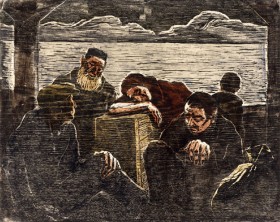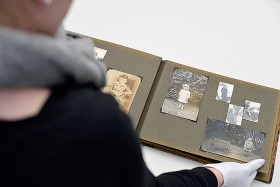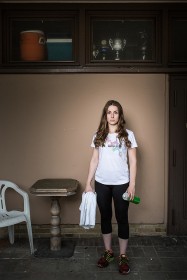An Internet Harvest for the Day of the Refugee

“Refugees”, color woodcut by Jakob Steinhardt, 1946, purchased with funds provided by Stiftung DKLB. You can find this and other related objects in our German-language collection database.
This year’s Day of the Refugee takes place today, 2 October 2015 as part of Intercultural Week, with the slogan “Refugees Welcome!” We have taken this as an occasion to go through our own and other websites and blogs, gathering items on this subject. Since we work at a Jewish museum, stories about fleeing are part of our ‘everyday business’: practically all of the family collections given to our museum tell stories of persecution and flight, going beyond mere statistics to depict the fates of individuals. Letters, travel documents, photographs, and personal memorabilia tell of the desperate search for a country to emigrate to, failed or successful emigrations, the often difficult life in a foreign country, the search for relatives, friends, and former neighbors, now scattered across the entire world. We tell these stories in our permanent exhibition and they have also been the subject of various special exhibitions. At the moment, for instance, in our current cabinet exhibition “In a Foreign Country” you can see publications that originated in Jewish Displaced Persons Camps. Jewish men and women waited there for their passage to Palestine or later Israel, to the USA and other countries, where they hoped to start a new life after the Shoah.
In addition to our exhibitions, we also make stories of flight and displacement visible online, for example with a selection of objects: → continue reading

At work, view over the shoulder – open photo album of Olga Irén Fröhlich © Jewish Museum Berlin, photo: Oliver Stratz
I’m looking at recorded instants of an eventful life. 511 moments. Captured by photography, meticulously organized according to subject matter over four photo albums. They come from the estate of Olga Irén Fröhlich, a German-Jewish singer and cabaret artist who worked from the 1930s into the 1960s.
Interesting and poignant biographical stories are often hidden behind the photographs that come into my hands every day. The history of these four photo albums and their one-time owner is a very particular one for me, however, because it’s at once unusual and moving. → continue reading
The 14th European Maccabi Games (EMG) are taking place in Berlin from 27 July until 5 August 2015. More than 2,000 Jewish athletes from 36 countries will compete in 19 sports from football to fencing to chess. To accompany the games Tamar Lewinsky and Theresia Ziehe are producing a series of portraits with interviews, introducing a new member of the German delegation from Berlin every day here on the blog. They conducted the interviews on the grounds of the TuS Maccabi in Berlin’s Grunewald where Stephan Pramme also shot the portraits.
Daliah Hoffmann (24), half-marathon

Daliah (24) Half Marathon © Jewish Museum Berlin, photo: Stephan Pramme
Daliah, why are you taking part in the European Maccabi Games?
I’m here because sports are an extremely important part of my life, and, of course, I want to experience this event in Berlin; it’s an opportunity not to be missed. However, I thought twice about it because I’ve already run a half-marathon this year, and that was enough. Yet it’s really nice to run together with family.
What’s required to participate in these Games?
First of all, you have to show you’re Jewish with your birth certificate and those of your family, as far as I can recall. If it were up to me, I’d also let people in who somehow feel connected to the religion. I think it’s unfortunate that some aren’t allowed to be part because they aren’t Jewish on paper, but feel Jewish or were raised Jewish, even if their mother isn’t.
What does Judaism mean to you personally? → continue reading


